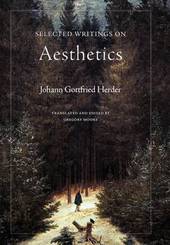
|
Selected Writings on Aesthetics
Hardback
Main Details
| Title |
Selected Writings on Aesthetics
|
| Authors and Contributors |
By (author) Johann Gottfried Herder
|
|
Edited and translated by Gregory Martin Moore
|
| Physical Properties |
| Format:Hardback | | Pages:480 | | Dimensions(mm): Height 235,Width 152 |
|
| Category/Genre | Philosophy - aesthetics |
|---|
| ISBN/Barcode |
9780691115955
|
| Classifications | Dewey:111.85 |
|---|
| Audience | | Professional & Vocational | | Tertiary Education (US: College) | |
|---|
|
Publishing Details |
| Publisher |
Princeton University Press
|
| Imprint |
Princeton University Press
|
| Publication Date |
23 July 2006 |
| Publication Country |
United States
|
Description
A seminal figure in the philosophy of history and language, Johann Gottfried Herder (1744-1803) also produced some of the most important and original works in the history of aesthetic theory. His ideas influenced Hegel, Schleiermacher, Nietzsche, Dilthey, J S Mill, and Goethe. This book presents most of Herder's important writings on aesthetics.
Author Biography
Gregory Moore is Lecturer in German at the University of St. Andrews. He is the author of "Nietzsche, Biology and Metaphor", and is coeditor of "Nietzsche and Science".
Reviews"Herder, a major figure in 18th-Century Germany's burgeoning studies in aesthetics, is here given ample scope on which to base critical judgment. Moore's Johann Gottfried Herder presents excerpts from some of Herder's most important writings, much of it translated into English for the first time. An important contribution to our knowledge of the history and origins of aesthetics."--Art Times "These excellent translations make some of Herder's most original and important contributions to aesthetics available to English readers for the first time."--Choice "To read [Herder] in this superb compilation is to encounter a vivid presence, one whose fingertips still seem fresh from the touch of truth."--Eric Ormsby New York Sun "I would strongly recommend scholars and librarians to acquire this important volume. It will be particularly useful in courses on eighteenth-century aesthetics for students without a command of German. Its readers will have the opportunity to discover an aesthetic thinker of the stature and originality of Lessing and Diderot."--K. F. Hilliard, Modern Language Association
|